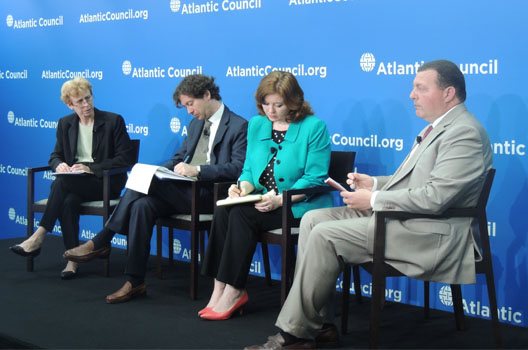 On June 7, 2016 the Atlantic Council’s Rafik Hariri Center for the Middle East launched a new report, A Transatlantic Strategy for a Democratic Tunisia. The Atlantic Council’s Fran Burwell moderated a discussion between Amy Hawthorne of the Project on Middle East Democracy and Atlantic Council senior fellow Karim Mezran, all coauthors of the report. International Monetary Fund (IMF) economist Andrea Gamba also participated in the discussion. Assistant administrator for the Middle East at the US Agency for International Development (USAID) Paige Alexander and managing director for the Middle East and North Africa at the European External Action Service Nicholas Westcott provided opening remarks.
On June 7, 2016 the Atlantic Council’s Rafik Hariri Center for the Middle East launched a new report, A Transatlantic Strategy for a Democratic Tunisia. The Atlantic Council’s Fran Burwell moderated a discussion between Amy Hawthorne of the Project on Middle East Democracy and Atlantic Council senior fellow Karim Mezran, all coauthors of the report. International Monetary Fund (IMF) economist Andrea Gamba also participated in the discussion. Assistant administrator for the Middle East at the US Agency for International Development (USAID) Paige Alexander and managing director for the Middle East and North Africa at the European External Action Service Nicholas Westcott provided opening remarks.
Westcott opened his remarks by praising the strides Tunisia has made since 2011 and touching on the importance of the country’s transition for the region and the world. He also outlined the three core challenges that the country is facing from the perspective of the European Union, namely slow economic growth, an unstable security situation, and high popular expectations for swift government reform. He noted that since 2011, the European Union has worked to help Tunisia overcome these challenges by providing more than EUR 3 billion to support economic and political development. He also underlined the “privileged partnership” between the European Union and Tunisia, adding that the European body will provide Tunisia with EUR 200 million in grants and $500 million in loans in 2016.
Hawthorne kicked off the panel discussion by emphasizing the importance of building stronger transatlantic cooperation on Tunisia and elevating the country to priority status in the US and European capitals, despite the existence of many other competing assistance priorities’ in the region. She argued that the benefits to enhancing strategic cooperation and targeted assistance to Tunisia outweigh the challenges. She discussed the three priority areas for assistance identified in the report: economic development, security assistance, and democratic progress. She concluded that the overarching goal of US-European support should be helping Tunisia develop as a democracy.
Mezran focused on the country’s political environment, explaining that the weakening of most of Tunisia’s political parties is leading to political fragility. He called on the international community to help Tunisia address the challenges it faces in the political sphere. He also emphasized the importance of strengthening Tunisia’s pro-democracy forces and civil society actors as a way to guard against enemies of democracy. During his remarks, he highlighted the importance of a national dialogue in Tunisia ahead of local elections in 2017 in order to prepare the country for decentralization.
Gamba spoke of the IMF’s involvement in helping promote Tunisia’s economic growth since the revolution in 2011. He explained that the two-year standby agreement signed in 2013 between the IMF and Tunisia was aimed at helping Tunisia achieve economic stability. Now, the IMF is focusing on helping Tunisia implement key structural reforms in the financial sector and civil service through the four-year extended fund facility agreed to in April 2016.
During the question and answer period, Alexander and Westcott spoke of the US and European comparative advantages in assistance to Tunisia. Alexander explained that the US is well-placed to assist Tunisia with entrepreneurship and job creation, as well as democratic institution building. Westscott said that the European Union is focusing on commercial and trade relationships with Tunisia and helping the country develop an encouraging business climate.
Tunisian Ambassador to the United States Fayçal Gouia was also in attendance and gave brief remarks during the question and answer period. He agreed with the points made in the report about increased cooperation on Tunisia, and called for increased coordination among all stakeholders in Tunisia’s success. He also urged the United States to begin negotiations on a free trade agreement with Tunisia, noting the benefits of Tunisia’s FTA with the European Union that has been in place since 1995. He said such an agreement with the United Stets would send a positive signal to the global business community that Tunisia is a reliable economic partner.
Burwell concluded the panel by noting that despite the challenges facing greater transatlantic coordination for assistance to Tunisia, the discussion clearly demonstrated the interest that all of the above stakeholders have in Tunisia’s success.
